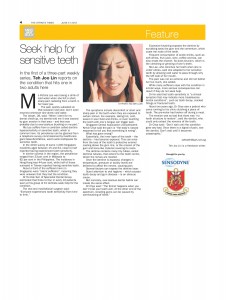 This article first appeared in the June 21, 2012 issue of the Straits Times. We have reproduced it for the information of those of you who missed it when it was published.
This article first appeared in the June 21, 2012 issue of the Straits Times. We have reproduced it for the information of those of you who missed it when it was published.
Ms Petrina Lee was having a drink of cold water when she felt a short, sharp pain radiating from a tooth in her lower jaw.
The pain quickly subsided on that occasion last year, but it soon returned whenever she drank cold water.
The lawyer, 28, said: “When I went for my dental check-up, my dentist told me it was caused by gum erosion in that area – and that was probably due to over-zealous brushing on my part.”
Ms Lee suffers from a condition called dentine hypersensitivity or sensitive teeth, which is common here. Its prevalence can be gleaned from a telephone survey commissioned by health-care giant GlaxoSmithKline, which sells toothpaste for sensitive teeth.
In the 2010 survey of some 1,000 Singapore residents aged between 15 and 64, close to half reported having experienced tooth sensitivity.
In similar surveys in the region, the prevalence ranged from 33 percent in Malaysia to 82 per cent in the Philippines. The incidence in Hong Kong was 44 per cent, while half of those surveyed in Taiwan reported having sensitive teeth.
About a third of the sufferers here (in Singapore) were “latent sufferers”, meaning they were unaware that they had the condition.
Dr Ho Kok Sen of Specialist Dental Group estimated that three to four in every 10 patients seen at his group of 10 dentists seek help for the condition.
The oral and maxillofacial surgeon said: “Everyone experiences tooth sensitivity from time to time.”
The symptoms include discomfort or short and sharp pain in the teeth when they are exposed to certain stimuli. For example, taking hot, cold, sweet or sour food and drinks, or even touching the teeth with one’s tongue can trigger pain.
Singapore Dental Association vice-president Kelvin Chye said the pain is “the body’s natural response to tell you that something is wrong”.
What has gone wrong?
Essentially, the inner layer of the tooth – the dentine – has become exposed. This can arise from the loss of the tooth’s protective enamel coating above the gum line, or the erosion of the gum and bone-like material covering its roots.
The dentine contains many tiny tubes, called dentinal tubules, that extend to the tooth centre, where the nerves are located.
Once the dentine is exposed, changes in temperature, pressure or acidity levels are believed to affect the nerves, causing pain.
Several factors can expose the dentine layer.
Scant attention to oral hygiene – which causes tooth decay and gum disease – is an obvious cause.
But ironically, over-zealous dental habits can create the same effect.
Dr Chye said: “The former happens when you don’t treat your teeth well. At the other hand of the spectrum, receding gums can be caused by over-brushing of teeth.”
Excessive brushing exposes the dentine by scrubbing away the gum and the cementum, which coats the roots of the teeth.
Frequent consumption of acidic drinks, such as soft drinks, fruit juice, wine, coffee and tea, can also erode the enamel. So does bruxism, which is the clenching or grinding of one’s teeth.
Ms Lee, who clenches her teeth when she is under stress, said she adapted to her sensitive teeth by allowing cold water to pass through only the left side of her mouth.
The pain was not so extreme and did not bother her too much, she added.
While many sufferers cope with the condition in similar ways, more serious consequences can result if they do not seek help.
Dr Ho said that tooth sensitivity is “a clinical symptom that may indicate more troublesome dental conditions”, such as tooth decay, cracked fillings or fractured teeth.
About two years ago, Dr Chye saw a patient who came running to his clinic clutching a piece of tooth. The pre-molar had broken off during a meal.
The erosion was so bad that there was “no tooth structure to restore”, said the dentist, who could only extract the remains of the tooth.
Dr Chye said: “Don’t wait until the condition gets very bad. Once there is a signal of pain, see the dentist. Don’t wait untill it becomes catastrophic.”





